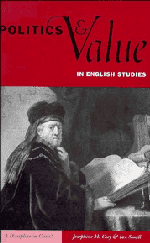6 - The discipline of English
Published online by Cambridge University Press: 27 January 2010
Summary
To maintain its academic authority English (or literary) studies has to conform to a widely accepted set of criteria and conditions which distinguish disciplines of knowledge from bodies of knowledge. English has, that is, to possess a clearly defined object of study, a set of specialist practices appropriate to explaining it, a theory (or theories) of those practices, and ways of evaluating theories. Our overall argument has been that recent radical critiques of the discipline have largely ignored the existence of these criteria and conditions, and as a result have focused not on the nature of the knowledge produced by English studies, but upon its function. The problems which we have described in all the programmes to reform the discipline derive from this failure to distinguish between the general conditions for disciplinary knowledge and the functions of the knowledge produced by particular disciplines. The conflation of the institutional and the intellectual, the epistemological with the political, described in chapter I, have their origins in this failure; so too do the problems produced by both the misunderstanding of the role of theory within disciplines and the contradictory nature of multicultural reforms of the canon. Critiques of the knowledge produced in English studies invariably rest upon the perception that such knowledge is value-laden. Here once more a failure to distinguish between the nature and function of disciplinary knowledge has led to a misunderstanding of how such value-judgements operate. We maintained in chapter 3 that problems of value are überhaupt problems; they are a condition of all knowledge and therefore of all disciplines of knowledge.
- Type
- Chapter
- Information
- Politics and Value in English StudiesA Discipline in Crisis?, pp. 156 - 182Publisher: Cambridge University PressPrint publication year: 1993

